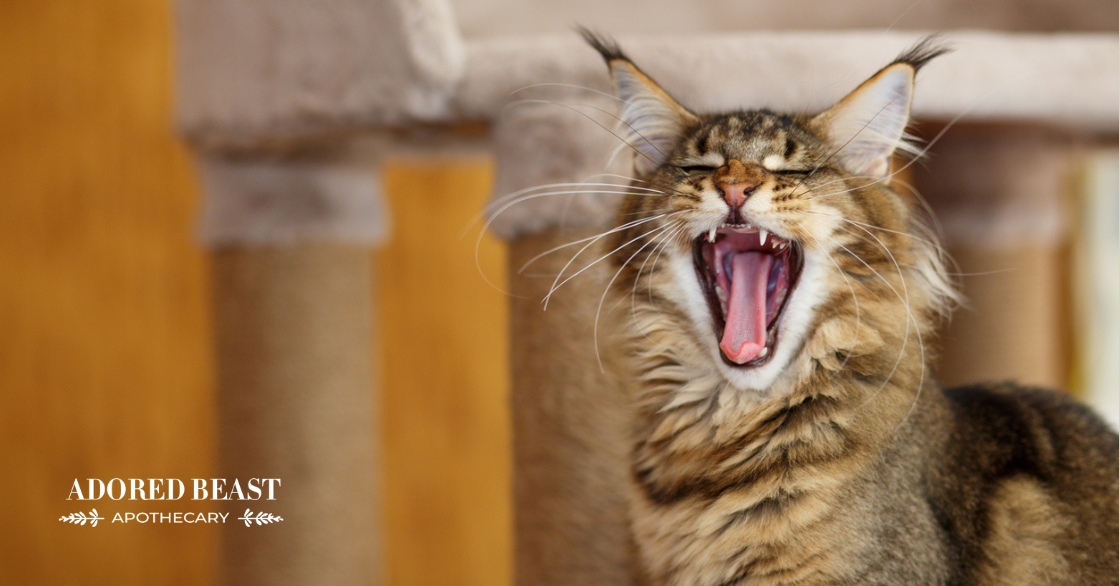Our animals’ oral health, just like ours, is very important. We need to pay attention to the teeth – the entire mouth, in fact – to help prevent issues from arising down the road.
And those potential issues can not only effect the mouth, but the entire body.
Plus, when something is off with our animals’ mouths, it can be terribly painful. This is something we all want to avoid or remedy if we can.
One of the issues that can arise in the mouth is stomatitis. And thankfully, stomatitis in cats and dogs is rare (about 10% of cats, and far more uncommon in dogs). That said, we seem to be hearing more about it recently, so that’s why we’re talking about it today.
What is Stomatitis in Cats and Dogs?
Despite its name, this condition has nothing to do with the stomach. It’s in fact all related to oral health.
Feline stomatitis is also called feline chronic gingivo-stomatitis (FCGS). Canine stomatitis is also called canine chronic ulcerative stomatitis (CCUS).
In either case, it is a painful condition that causes severe inflammation of the entire mouth, including the gums, oral mucosa, tongue, and the back of the mouth. It is a paradental disease because it does not attack the tissues that attach the tooth to the socket, but instead it attacks the tissues that surround the teeth.
Stomatitis can cause the following symptoms:
- Drooling
- Severe bad breath
- Pus-like oral discharge
- Decreased appetite
- Ulceration of parts of the tongue
- Calculus (tartar) on the teeth, ranging from mild to severe
- Gingivitis, ranging from mild to severe
- Crying when eating/refusal to eat
- Ulcerations on the areas of the cheek that contact teeth (otherwise known as “kissing lesions”)
The cause of stomatitis is unknown, but most consider it to be most likely an exaggerated response to bacteria and plaque on the teeth.
Managing Stomatitis
Successful management of stomatitis requires minimizing bacteria in the mouth as much as possible. This is rarely achieved through at-home dental care or anesthetized cleanings alone, as even a small amount of bacteria or plaque can be seen in animals with severe stomatitis.
In fact, stomatitis often causes severe inflammation that does not resolve or quickly returns after a thorough dental cleaning. The current recommended treatment by most conventional veterinarians is partial or full-mouth tooth extraction surgery.
And we think that’s pretty extreme…
Instead, Julie Anne Lee DCH RCSHom, Adored Beast founder and formulator, suggests using a protocol to address both the bacterial growth and the resulting inflammation. This is because it helps to address a variety of the elements of stomatitis in dogs and cats.
- Fido’s Flora (for dogs) or Felix’s Flora (for cats). These are our species-specific probiotics. They can be useful for stomatitis because they help with building the good bacteria in the body – including the mouth – and can help address auto-immune disease.
- Jump For JOYnts. This homeopathic combination is ideal because it helps to support healthy bones, which is a part of what is affected by stomatitis. Arnica is commonly used for pain and inflammation, ruta grav is commonly used for soreness in bones, tendons, joints and cartilage, calendula is commonly used as a healing agent and first aid for injuries, and symphytum (comfrey) commonly used for injury to bones, cartilage, tendons and periosteum. It supports degenerative diseases (stomatitis is in this group!)
- Liver Tonic. This herbal combination helps support your animal’s liver, kidneys, gallbladder, and pancreas. All of these organs are paramount in the detoxification process. By supporting them, you help boost their ability to filter waste from the body naturally. By clearing out the build up of debris, bacteria, heavy metals, etc., it doesn’t get caught up in the body, and thus won’t contribute to the body’s current state of inflammation. So, by helping these organs remove that waste, you’re giving the entire body – including the mouth – a chance to rebalance.
- Turkey Tail Mushrooms. Turkey Tail Mushrooms contain beta glucans, polysaccharides, and polyphenols which have potent antioxidant, anti-inflammatory, and anti-viral properties. Turkey tail mushrooms help to balance the immune system, thereby supporting the body in managing conditions like stomatitis.
- Phyto Synergy. Our Phyto Synergy is 100% pure phytoplankton. It contains an amazing amount of Superoxide Dismutase, one of the most powerful antioxidants we know of. It can assist the body in repairing oxidative stress, promoting healthy cell growth and, help eliminate unhealthy or harmful cells in the body.
Stomatitis in cats and dogs, although rare, does happen. And when it does, you want to make sure you work quickly to resolve it. Once you’ve received a diagnosis, support healing with natural supplements that aid the body in removing the harmful bacteria and bringing down pain and inflammation.












![[RESEARCH] Is Herbicide Safe for Dogs?](https://blog.adoredbeast.com/wp-content/uploads/2025/06/herbicides-safe-for-dogs-103x55.png)